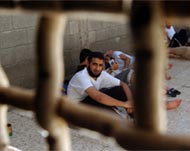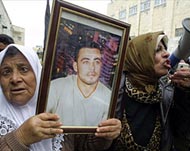Palestinians’ ‘hunger solidarity’
Thousands of Palestinian political prisoners being held in Israeli jails have begun a hunger-strike in protest over their living conditions, Palestinian and Israeli security sources said.

The strike marks the beginning of a month-long prisoner solidarity campaign being coordinated by several Palestinian civil society groups, which will culminate in a mass procession in Ram Allah led by the grandson of Mahatma Gandhi, Arun Gandhi.
More than 4000 prisoners are expected to eventually take part in the strike, according to the Palestinian Political Prisoner’s Society, with an additional 2000 set to participate in some symbolic fashion over the next few weeks.
The prisoners have submitted a list of demands, which include improved health and sanitary conditions, increased family visitation rights, an end to strip searches and to “arbitrary and indiscriminate beatings”, among other things.
The prisoners have said they will live only on fluids until their demands are met.
Draconian response
Public Security Minister Tzachi Hanegbi has said the prisoners can “starve to death” for all he cares.
“The prisoners can strike for a day, a month, even starve to death, as far as I am concerned. We will ward off this strike and it will be as if it never happened,” he said on Friday.
 |
|
Human rights groups have criticised |
In response to the strike, the Israeli Prison Service imposed even further restrictions, removing radios and television sets from jail cells and cancelling all family visits.
The prison service claims the mass hunger strike is a plot designed to undermine Israeli attempts at preventing prisoners from planning bomb attacks in their cells.
“This is not a protest about inhumane conditions or violation of human rights … the point behind the hunger strike is basically to combat the security of the state of Israel and of the prison service,” a spokesperson of the prison service told Aljazeera.net.
“It’s unfortunate that the prisoners are refusing to receive food because of these reasons,” he added.
“Hellish conditions”
According to the Palestinian Prisoner’s Society and numerous international human rights organisations, including Amnesty International and Human Rights Watch, Palestinian prisoners suffer from deplorable humanitarian conditions, including medical negligence, unsanitary surroundings, and routine beatings, position torture and strip searches.
“They live in hellish conditions that are intolerable by any human standards,” said Isa Qaraqi, director of the Prisoner’s Society.
“The goal of the hunger strike is to improve the humanitarian conditions inside the prisons,” he added.
About 800 prisoners are in need of medical treatment, says Qaraqi, and 30 have been in solitary confinement for over two years. More than 2000 prisoners have been unable to visit their families under the pretext of “security”, and those who can are not allowed to make any physical contact with them.
Even letters and books have been banned, says Qaraqi, making it impossible for prisoners who wish to continue with their education to do so form inside their cells.
Prisoner abuse?
The Israeli Prison Service spokesperson said strip searches were necessary to ensure cellular phones and illicit directives were not being smuggled into the prison cells.
He denied any allegations about prisoner abuse, despite documentation by human rights groups to the contrary.
 |
|
Palestinians have tried to gain global |
A recent report by the Israeli Public Committee Against Torture found a sharp rise in the “torture, ill treatment, humiliation and incarceration in inhuman conditions” of Palestinian detainees during the last year.
The study is based on the analysis of dozens of affidavits and testimonies. Surveyed Palestinians reported routine beatings, kicking, shaking, being forced into painful positions and having handcuffs intentionally tightened.
Palestinian response
Palestinians say the Israeli spokesperson’s comments are “a big lie” intended to deride an act of peaceful resistance to one facet of Israel’s brutal military occupation.
“This is a big lie … if [security] is their issue, then why don’t they respond to the humanitarian needs of the prisoners?” said Mahmud Ziadi, representative of the Families of Palestinian Political Prisoners.
“All they are asking is for their children and wives to be able to visit them; they are asking for sun and medicine. Instead the Prison Service issues racist declarations against them.”
No rights
The situation of the Palestinian political prisoners is aggravated by the absence of any law defining their status and rights. Despite 114 clauses in the Israeli Prison Ordinance, not one spells out the rights of Palestinian prisoners, according to the Palestinian group Addameer Prisoner’s Support and Human Rights Association.
While the Ordinance provides a legally binding set of rules formulated by the minister of interior, they are not incumbent upon the prison authorities, nor is there a clause guaranteeing prisoners minimum standards of life, says the association.
It is legally permissible to intern 20 inmates in a cell no larger than 5m long, 4m wide (20 square metre) and 3m high, including an open lavatory. The minimum standard in US and European prisons is 10.5 sqm for each detainee. Prisoners may be confined indefinitely to such cells for 23 hours a day.
 |
|
Palestinian officials have failed to |
ore than 650,000 Palestinians have been detained by Israel since the 1967 war, accounting for about 20% of the Palestinian population – the highest rate of incarceration in the world says the prisoner’s rights organisation.
The overwhelming majority of Palestinian prisoners are political captives who have been arbitrarily imprisoned or detained under the broad banner of “security”, according to the Israeli human rights group B’tselem.
“If these same standards were applied inside Israel, half of
the Likud party would be in administrative detention,” noted the group.
More than 7000 Palestinians, 324 children among them, are currently being held in Israeli jails or detentions centres.
Four hundred and fifty of these are being held without charge under Military Order 1500, a relic of British rule in Palestine which allows Israeli authorities to detain an individual, adult or minor, for up to six months without bringing charges against him.
This time limit is seldom upheld, however, with detention being extrapolated into several years.